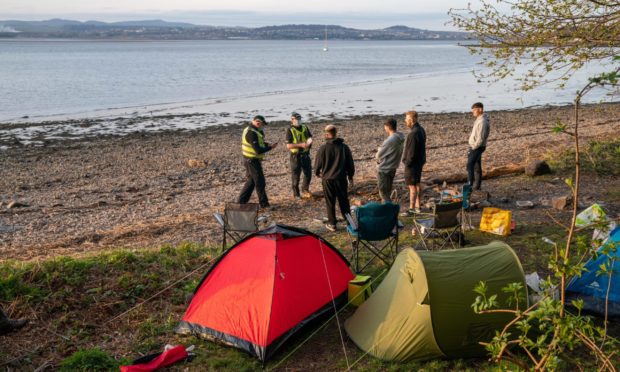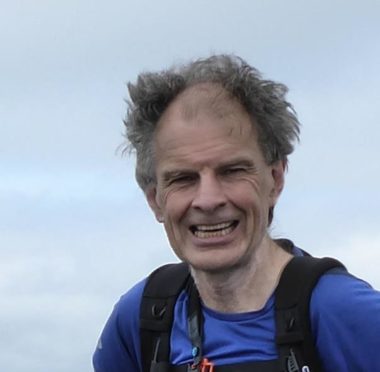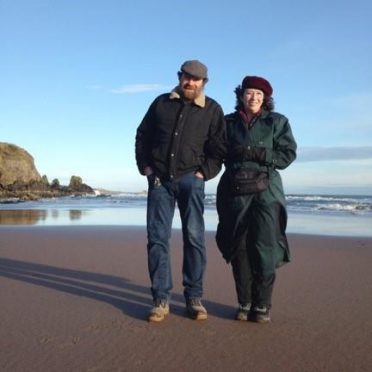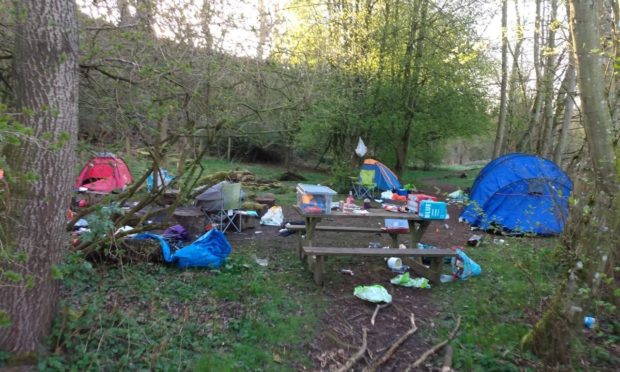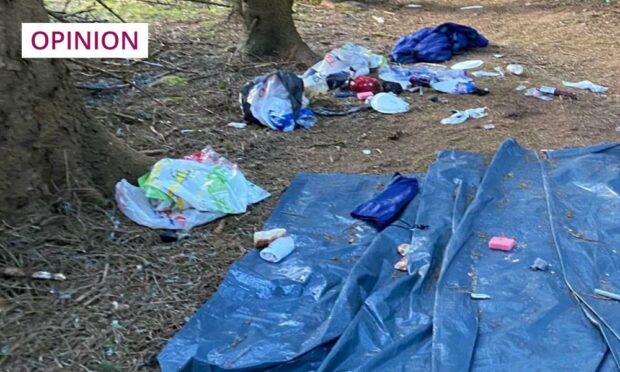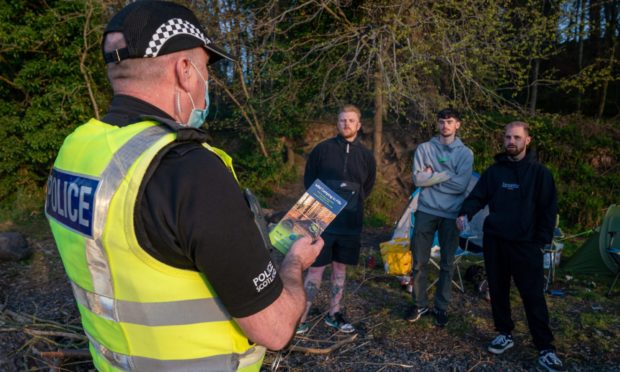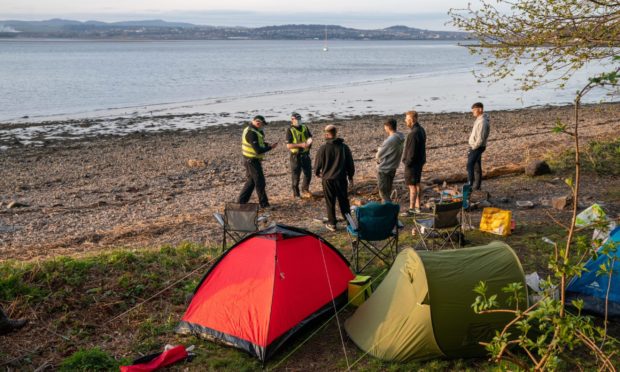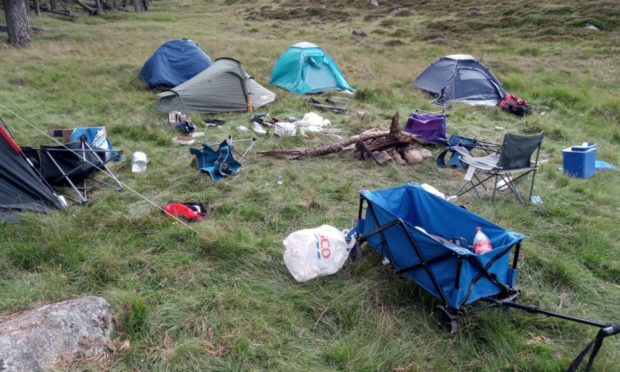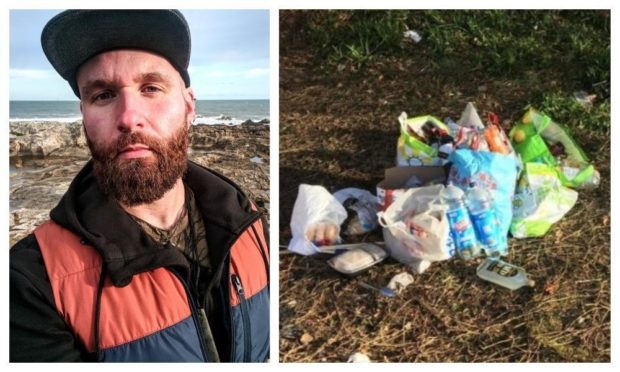Prison sentences, fines, better facilities and more education should be used to stop ‘dirty camping’, according to our readers.
Residents from across Tayside and Fife spoke to us about their experience of the problem. They gave us their suggestions for tackling ‘dirty camping’ this summer.
Perthshire, Fife and Angus rural communities are already coming under pressure as hundreds of campers, many with little or no experience of outdoor access rules, visit beauty spots
But the readers we spoke to stopped short of calling for a Scotland-wide permit system for wild camping.
Managers at the Loch Lomond and Trossachs National Park have used this approach to deal with anti-social behaviour problems
‘Lock them up’
Kate, from Strathkinness, proposed a tough approach because she has been left “disgusted” by the growing problem.
She said: “Lock them up. Make them do many hours community service clearing up after others like themselves.”
She said there was no excuse for anyone not to take their litter home.
“This needs to start with the parents educating their children orally and by example.”

While the Land Reform (Scotland) Act 2003 provides rights of access to most land and inland water for outdoor recreation it does not legitimise the anti-social behaviour linked to dirty camping.
Much of the behaviour that causes significant problems is already a criminal offence.
Police have powers under the Antisocial Behaviour etc (Scotland) Act 2004 to issue on-the-spot fines called fixed penalty notices (FPNs) to people who are behaving in antisocial ways and causing annoyance to others.
Criminal offences linked to dirty camping incidents can also include breach of the peace, vandalism and malicious mischief.
The Environmental Protection Act also legislates against dumping litter and camping materials.
‘Lungs of Dundee’
Nick Kempe, a Glasgow-based access campaigner, highlighted a lack of facilities in Tayside.
The former president of the Mountaineering Council of Scotland said there is no sufficient infrastructure to support camping.
“Scotland has got a very small number of places to camp. The situation has got way worse over the last 30 years.
Owners have converted many campsites to caravan parks, he added.
“If you look at all the Angus Glens, all the way from Glen Shee, Glen Prosen, Glen Clova, there’s not a single camping facility in all those glens.
We are lacking basic campsites in Scotland.”
Hiker Nick Kempe
“Yet all those areas should be the lungs of Dundee. They are the areas where Dundonians have traditionally gone.
“We are lacking basic campsites in Scotland with a toilet and a litter collection point. That would solve a huge amount of the problem.”
Nick previously campaigned for the Land Reform Act, enshrining access rights into Scottish law.
But he warned against introducing more laws to control wild camping in a similar fashion to Loch Lomond.
“It hasn’t solved the problem. They have limited campers to certain areas, but they’ve put no facilities in, so what’s happened is the problem of human waste has got worse in places.
“Some of the permit areas are disgraceful.”
Tackle ‘festival culture’
Angus glass artist Lisa Badger lives in Hawkhill overlooking Lunan Bay where communities are already working to a stop ‘dirty camping.’
She said camping on the dunes had recently “got really dirty.”
“When I was young, I was part of the festival culture. But we didn’t have cheap tents that we could throw away. We cleaned up after ourselves.
“People leave tents behind them at festivals and they are taking this culture and spreading it around the country.”
She supports more education on taking care of the landscape and more enforcement from police officers.
Her view is that “policing isn’t consistent across Scotland. In Perthshire they seem to have a little more teeth, regards how much they are allowed to get dirty camping under control.
“People need education on why they can’t all come piling up in here.”
I recently spoke to a reporter @thecourieruk about #dirtycamping & #littering across Scotland. We need united enforcement & #education. I discuss possibilities we can adopt in a recent article. Read more here: https://t.co/aO9R48sJUA
— Steven Sinclair (@SSinclair1611) April 20, 2021
Walker Carol Greig, from Newport-on-Tay, called for more enforcement to stop dirty camping.
“Would they actually leave all that rubbish lying about in their own back gardens.
“There should be penalties for leaving places in such a mess and they should be enforced.
“There’s no point having a notice saying there will a £100 fine that everybody knows will never be enforced or policed.”
Police ‘will not hesitate’ to use enforcement powers
A Police Scotland spokeswoman said: “Park rangers and local authorities have enforcement powers when it comes to anti-social behaviour issues like dirty camping and can issue fines.
“Police Scotland will support this activity where required and will continue to provide a visible presence at beauty spots to deter illegal behaviour.
“Where criminality is established, officers will not hesitate to engage with the public and use police enforcement powers if necessary.”
Simon Jones, conservation director at the Loch Lomond & The Trossachs National Park, said seasonal camping byelaws “are one of the tools we use” to manage issues linked to camping.
“We also work hard to tackle this through education, engagement and communications,” he added.
“Given the increased visitor numbers we are experiencing, we are working more closely than ever with partner authorities including Perth and Kinross Council and Police Scotland to have additional resources and measures in place to tackle these issues.”
